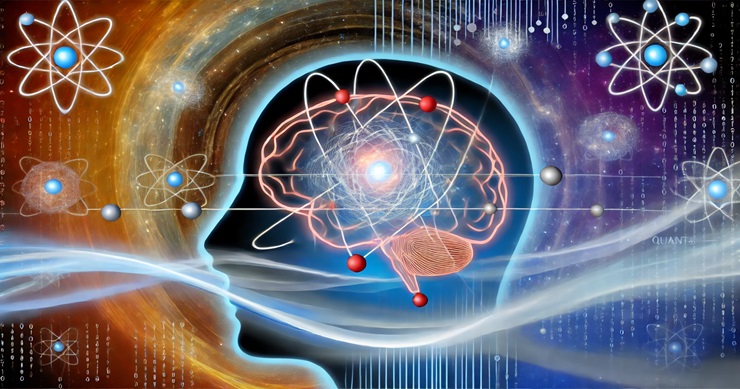How Quantum Mechanics Sheds Light on the Nature of Consciousness and Its Role in the Universe
Introduction
Consciousness remains one of the most profound mysteries in science. While classical theories focus on neurobiological and cognitive aspects, recent advancements suggest that quantum mechanics might hold the key to understanding consciousness. This exploration is not only pivotal for science but also aligns with the mission of Species Universe—to integrate scientific insights and ancient wisdom in unraveling the universe’s mysteries. This article delves into the history, core concepts, current trends, applications, challenges, and future prospects of the intersection between quantum mechanics and consciousness.
History and Background
The connection between consciousness and quantum mechanics gained prominence with the advent of quantum theory in the early 20th century. Physicists like Niels Bohr and Werner Heisenberg introduced concepts like superposition and entanglement, challenging classical notions of reality. In the 1980s, physicist Roger Penrose and anesthesiologist Stuart Hameroff proposed the Orchestrated Objective Reduction (Orch-OR) theory, suggesting that consciousness arises from quantum processes in brain microtubules. Despite skepticism, their work spurred further investigations into quantum consciousness.
Core Concepts/Principles
Quantum Mechanics Basics: At the heart of quantum mechanics are principles such as superposition, where particles can exist in multiple states simultaneously, and entanglement, where particles become interlinked across distances. These principles defy classical logic but are crucial in understanding potential mechanisms of consciousness.
Orch-OR Theory: Penrose and Hameroff’s theory posits that consciousness emerges from quantum computations within microtubules—structures within neurons. This hypothesis suggests that quantum coherence in the brain could explain the non-classical behavior of consciousness.
Quantum Decoherence and Collapse: Another key concept is quantum decoherence, where a quantum system loses its quantum properties through interaction with the environment, leading to a classical outcome. The collapse of the wavefunction—when a quantum state becomes a definite state upon observation—is also pivotal in theories linking quantum mechanics to consciousness.
Current Trends and Developments
Recent research has focused on experimental validation of quantum consciousness theories. Studies have investigated the role of microtubules and quantum coherence in neural processes. For instance, experiments with anesthetic gases have shown varying effects on consciousness, hinting at quantum influences. Additionally, collaborations between neuroscientists and quantum physicists, such as those involving Christof Koch and the Google Quantum AI team, aim to uncover quantum activities in the brain.
Applications and Implications
Neuroscience and Psychology: Understanding quantum mechanisms in consciousness could revolutionize neuroscience, offering new insights into brain function, mental health, and cognitive processes. It may explain phenomena like intuition, creativity, and altered states of consciousness.
Technology and AI: Quantum theories of consciousness could impact artificial intelligence, leading to the development of quantum computing models that emulate human-like consciousness. This could enhance AI’s ability to process information and make decisions in a more human manner.
Philosophy and Spirituality: The integration of quantum mechanics with consciousness resonates with philosophical and spiritual traditions, such as those in Vedic texts. It bridges science and spirituality, providing a scientific framework for concepts like interconnectedness and the non-dual nature of reality.
Challenges and Solutions
Empirical Validation: One of the primary challenges is the lack of empirical evidence directly linking quantum mechanics to consciousness. Addressing this requires innovative experimental designs and advanced technologies to detect and measure quantum activities in the brain.
Interdisciplinary Collaboration: The complexity of this field necessitates collaboration between physicists, neuroscientists, and philosophers. Initiatives like the Quantum Consciousness Project and partnerships with tech giants like Google can foster such interdisciplinary efforts.
Public Perception: Communicating the nuances of quantum consciousness to a broader audience is challenging. Simplifying complex theories without compromising accuracy and engaging educational platforms can help bridge this gap.
Future Prospects
The future of quantum consciousness research holds exciting possibilities. Advances in quantum computing and neuroimaging could provide the tools needed to explore and validate these theories. The implications extend beyond science, potentially transforming our understanding of reality and our place in the universe.
Consciousness Expansion: Future technologies might enable the coupling of human brains with quantum computers, expanding cognitive capabilities and altering our perception of reality.
Health and Well-being: Quantum insights could lead to novel treatments for neurological disorders, enhancing mental health and well-being.
Case Studies/Examples
Penrose and Hameroff’s Experiments: Their work on microtubules and quantum coherence has laid the groundwork for ongoing research, despite initial skepticism.
Christof Koch’s Collaborations: Koch’s interdisciplinary efforts with institutions like the Allen Institute and Google Quantum AI illustrate the potential of combining neuroscience with quantum physics to unlock the mysteries of consciousness.
Conclusion
The exploration of consciousness through the lens of quantum mechanics is a burgeoning field with profound implications. By integrating these scientific insights with the mission of Species Universe, we move closer to understanding the ultimate nature of reality and our place within it. This journey not only enriches our scientific knowledge but also aligns with the ancient wisdom that has long hinted at the interconnectedness of all existence.
Call to Action: For those intrigued by the intersection of quantum mechanics and consciousness, we encourage further reading and engagement with related content. Subscribe to our newsletter, leave comments, and share this article to foster a community dedicated to unraveling the universe’s mysteries.
References:
- “Quantum mechanics and the puzzle of human consciousness” – Allen Institute
- “Consciousness and Quantum Mechanics” – Oxford Academic
- “Can quantum effects in the brain explain consciousness?” – New Scientist
These sources provide foundational insights and ongoing research that inform the article, bridging the gap between theoretical physics and the enigma of consciousness.


Leave a Reply